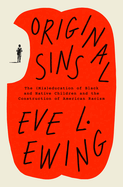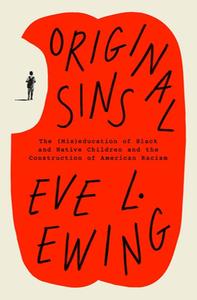
 What is education for, or, better yet, who is it for? This is the central question that Eve L. Ewing, associate professor in University of Chicago's Department of Race, Diaspora, and Indigeneity, asks in Original Sins: The (Mis)Education of Black and Native Children and the Construction of American Racism. Ewing calls readers to consider not just what they assume educational space to be, but to examine the historical contexts of the development of formal and institutional education for Indigenous and Black children in the United States. She thoroughly and carefully outlines that educational spaces were and still are often carceral spaces for Native and Black children, how this was deliberately constructed, and, crucially, what paths forward might yet exist radically to reimagine education.
What is education for, or, better yet, who is it for? This is the central question that Eve L. Ewing, associate professor in University of Chicago's Department of Race, Diaspora, and Indigeneity, asks in Original Sins: The (Mis)Education of Black and Native Children and the Construction of American Racism. Ewing calls readers to consider not just what they assume educational space to be, but to examine the historical contexts of the development of formal and institutional education for Indigenous and Black children in the United States. She thoroughly and carefully outlines that educational spaces were and still are often carceral spaces for Native and Black children, how this was deliberately constructed, and, crucially, what paths forward might yet exist radically to reimagine education.
Ewing traces how education has become tied to conceptions of the American Dream, and how that dream, and the foundation of the country itself, is built on "two cornerstones": "the genocide and displacement of Indigenous peoples, and the institution of chattel slavery that held African people in bondage." "The schoolhouse," she writes, has not been "uninvolved with the construction of racial hierarchy" but instead "played a central role in furthering the work begun by slavery and settler colonialism." She goes on to outline the history of how schools were designed to propagate the idea of the intellectual superiority of whiteness from the beginning of American education, starting with Thomas Jefferson. Ewing then demonstrates through stories, anecdotes of teaching, and copious research how that racialized dynamic exists still, and is demonstrated through contemporary teaching practices. She skillfully connects the normalization of standardized testing, academic tracking, under-resourcing, and various disciplinary policies and their unequal application to eugenics, race science, and policies of disenfranchisement with the intention of limiting the possibilities and potentials for Black and Indigenous students.
Ewing makes a convincing argument through her analysis and unparalleled storytelling that unless education in the United States is radically reconsidered, schools will simply continue to maintain the legacy of inequality at the core of the nation. Importantly, she concludes with suggestions for ways forward, including pointing out that none of the habits of cruelty are inevitable: "people made it, and people can unmake it." Ewing challenges readers to reimagine schools that will help Americans to reimagine the world, so long as they go forward with the knowledge of the past, and actively reconstruct it. --Michelle Anya Anjirbag, freelance reviewer
Shelf Talker: Eve L. Ewing takes a historical view to argue that the U.S. education system needs a drastic overhaul, convincingly examining who it serves and who it continues to oppress.

